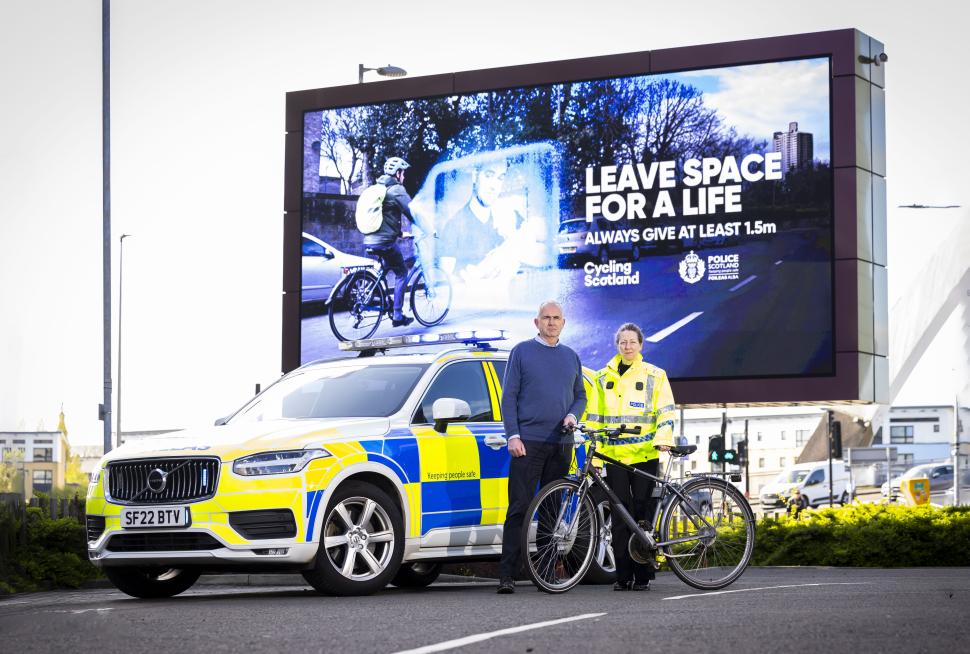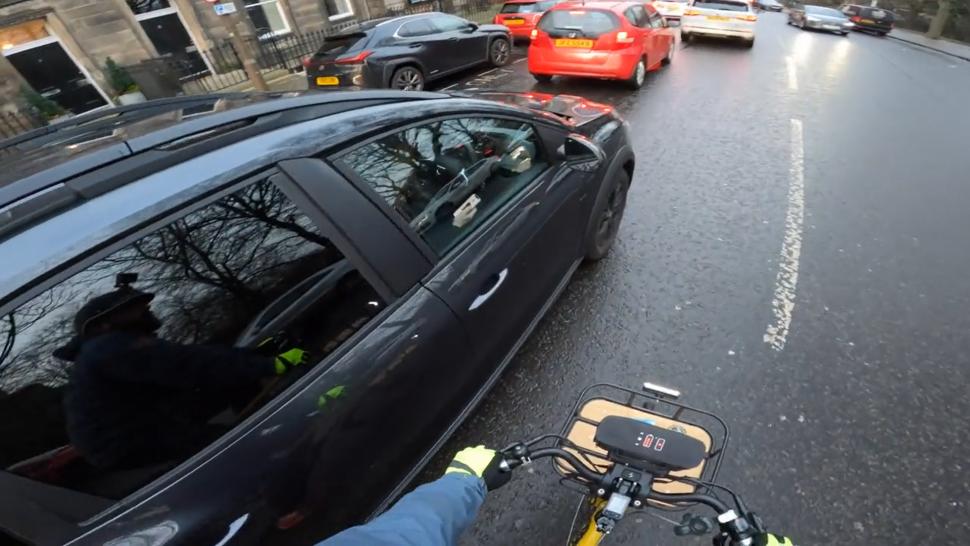- News
- Reviews
- Bikes
- Components
- Bar tape & grips
- Bottom brackets
- Brake & gear cables
- Brake & STI levers
- Brake pads & spares
- Brakes
- Cassettes & freewheels
- Chains
- Chainsets & chainrings
- Derailleurs - front
- Derailleurs - rear
- Forks
- Gear levers & shifters
- Groupsets
- Handlebars & extensions
- Headsets
- Hubs
- Inner tubes
- Pedals
- Quick releases & skewers
- Saddles
- Seatposts
- Stems
- Wheels
- Tyres
- Tubeless valves
- Accessories
- Accessories - misc
- Computer mounts
- Bags
- Bar ends
- Bike bags & cases
- Bottle cages
- Bottles
- Cameras
- Car racks
- Child seats
- Computers
- Glasses
- GPS units
- Helmets
- Lights - front
- Lights - rear
- Lights - sets
- Locks
- Mirrors
- Mudguards
- Racks
- Pumps & CO2 inflators
- Puncture kits
- Reflectives
- Smart watches
- Stands and racks
- Trailers
- Clothing
- Health, fitness and nutrition
- Tools and workshop
- Miscellaneous
- Buyers Guides
- Features
- Forum
- Recommends
- Podcast
news
 Cycling Scotland Leave Space for a Life campaign (Cycling Scotland)
Cycling Scotland Leave Space for a Life campaign (Cycling Scotland)Over a quarter of motorists in Scotland don’t know driving dangerously around cyclists could lead to driving ban or prison sentence – and over 50% say more cameras would “change their behaviour”, new survey finds
Education, enforcement, and networks of dedicated cycle lanes are key to reducing the number of cyclists killed and injured due to careless or dangerous driving, Cycling Scotland has said – after new research commissioned by the charity found that more than one in four people in Scotland are unaware that driving carelessly or dangerously around cyclists could result in a driving ban or prison sentence.
Meanwhile, as part of another Cycling Scotland survey, 58 per cent of motorists admitted that knowing their driving was being captured on camera would make them change their behaviour around people on bikes.
The findings of the two surveys have been revealed this week as Cycling Scotland, supported by Police Scotland, launches its annual Give Cycle Space nationwide road safety campaign, which aims to remind motorists of the risks of close passing and driving dangerously around cyclists.
Today we launch our road safety campaign, supported by @PoliceScotland, to remind people driving they always need to drive safely around someone on a bike. Give at least 1.5 metres of space when passing someone on a bike.#GiveCycleSpace pic.twitter.com/ngGDFgW6C7
— Cycling Scotland (@CyclingScotland) April 29, 2024
According to new Police Scotland data, on average four people a week in Scotland suffer serious, potentially life-changing injuries in collisions involving motorists while cycling.
And a new survey of 1,009 Scottish drivers has found that 27 per cent are currently unaware that driving carelessly or dangerously around people cycling can lead to a driving ban or prison sentence.
Meanwhile, a separate survey of over 500 motorists, also commissioned by Cycling Scotland, revealed that 58 per cent of drivers said that knowing a camera could capture their driving behaviour would lead them to change how they behave around cyclists.
However, despite that particular finding, Police Scotland continues to be criticised by cyclists for the ongoing delays surrounding the proposed introduction of an online road safety reporting portal (allegedly due to budget constraints) – delays which Cycling UK said last year were putting cyclists in Scotland “at risk”.
62 per cent also said that the risk of killing or seriously injuring someone would be the most likely factor to ensure they drive safely around someone on a bike.
The same percentage of drivers claimed to always double check their mirrors and blind spot for cyclists before making a turn and other manoeuvres, with the remaining 38 percent admitting they either often, sometimes, or rarely do so.
Last year, Police Scotland’s road safety figures for the period between 2015 and 2021 revealed that motorists were at fault in almost three-quarters of all collisions between cyclists and drivers, with the data also suggesting that common tropes about ‘dangerous’ cyclists, such as riders “wearing dark clothing”, are responsible for comparatively few crashes.
New analysis of police data also, Cycling Scotland says, revealed that a “significant” number of those motorists who were at fault in fatal collisions between 2015 and 2020 (almost one in ten of the total number, and roughly half of those whose criminal history records were available) had previous convictions for driving-related offences.
These latest findings come a few weeks after Cycling Scotland published its recent research into attitudes towards cycling, which found that more than two thirds of Scots consider not feeling safe on the roads the biggest barrier to making more cycle journeys, while 37 per cent said they would cycle more often if they were more confident.
62 per cent also said that they support re-allocating road space for cycling in their area, while 88 per cent believe cycling could improve health and wellbeing, a figure that has risen in comparison with 2022.
Launched this week, Cycling Scotland’s campaign – which will run online, on television and radio, and on buses – seeks to raise awareness of the legal passing distance of 1.5m and the responsibility of drivers to safely overtake cyclists (and the possibility of a £100 fine and penalty points for failing to do so), with the charity’s hard hitting ‘Leave Space for a Life’ advert underlining the risks of dangerous driving.
When you're driving, it might be easy to think "I can just squeeze past that bike" - but don't risk it. Close passes are dangerous, scary and have consequences. It's not just a bike, it's a person.#GiveCycleSpace pic.twitter.com/hifMFsajsm
— Cycling Scotland (@CyclingScotland) May 1, 2024
“More people are travelling by bike in Scotland which is really positive,” Simon Bradshaw, Cycling Scotland’s Road Safety Manager, said following the campaign’s launch.
“To improve our health and environment, we need to enable even more people to choose cycling. What we can’t do is accept a corresponding rise in serious injuries and deaths.
“The road safety TV ad shows someone cycling on the road from a driver’s viewpoint, together with images of their life and loved ones in the space next to them – we’re reminding drivers to Leave Space for a Life.
“Our message is that we’re all people, travelling on the road and wanting to get home safely. Dangerous and careless driving around people on bikes is risking someone’s life and risking serious legal consequences.”
He continued: “It's clear that a campaign on its own isn’t enough. We need urgent change including networks of dedicated cycle lanes and enforcement to reduce dangerous driving, especially given the number of repeat offenders involved in fatal crashes.
“Education can also play a key role in changing public opinion and behaviour and we will work with other organisations to ensure that such road safety awareness campaigns can continue.”
“Every driver has a responsibility to safely overtake cyclists,” Chief Superintendent Hilary Sloan, Police Scotland’s Head of Road Policing, added.
“Cyclists are vulnerable on the road and drivers should be aware of how they can help reduce serious and fatal collisions. Police officers are out every day educating road users and carrying out enforcement, and we are part of a crucial partnership response to road safety.”
After obtaining a PhD, lecturing, and hosting a history podcast at Queen’s University Belfast, Ryan joined road.cc in December 2021 and since then has kept the site’s readers and listeners informed and enthralled (well at least occasionally) on news, the live blog, and the road.cc Podcast. After boarding a wrong bus at the world championships and ruining a good pair of jeans at the cyclocross, he now serves as road.cc’s senior news writer. Before his foray into cycling journalism, he wallowed in the equally pitiless world of academia, where he wrote a book about Victorian politics and droned on about cycling and bikes to classes of bored students (while taking every chance he could get to talk about cycling in print or on the radio). He can be found riding his bike very slowly around the narrow, scenic country lanes of Co. Down.
Latest Comments
- pockstone 9 sec ago
Meanwhile...in other Cornish news, cyclists and their problems: https://www.cornwalllive.com/news/cornwall-news/worlds-gone-mad-litter-p...
- thax1 7 min 10 sec ago
Have no fear Laz. Pop over there and One can still share a happy wave with a Maga aero helmet wearer. Then bask in the bittersweet knowledge that...
- Car Delenda Est 9 min 38 sec ago
No. A publicly funded body abusing its power and artificially shaping UK politics.
- SecretSam 49 min 16 sec ago
just to be clear - do we know for sure that the humpy-pumpy system was to blame? Lucky he was on his own, imagine the carnage if he'd been in the...
- Rome73 49 min 44 sec ago
https://thebikeproject.co.uk/ this project in London does the same - if anyone has any unused bikes they would like to donate.
- ktache 9 hours 42 min ago
Quest are showing the Paris Roubaix highlights at 11 both days.
- chrisonabike 10 hours 26 min ago
Pretty sure a lot of that "more space for motor vehicles" was because fewer motor vehicles (also marginally "smaller motor vehicles")....
- thax1 11 hours 51 min ago
Cycliq certainly seemed to let a lot of people down in the early days. I held off until the 12 Sport came out, but have been impressed....
- ktache 11 hours 53 min ago
My better half seems to like giving me pressies of Rapha clothing. I am wearing their casual hoodie right now, and very nice it is too. First off...
- thax1 12 hours 3 min ago
Push on through foot numbness and you then arrive at agonising foot cramp....


Add new comment
36 comments
OTOH though people probably couldn't say for sure what if any legal sanction might attach to throwing heavy things off tall buildings without looking, I would expect more than 73% to guess that this could result in legal consequences...
Driving truly is an outlier in terms of being a non-trivial activity with dangerous and damaging consequences which society doesn't consider as such*. Overall given the frequency at which it's practiced and the range of people involved the risk and rate of harm is perhaps small. However any one driver can go from zero to multiple fatalities / demolishing part of a house in a second.
Of course certain kinds of drivers and certain situations make that much more likely. But most people are very certain that it's not us...
* It's tempting to say "by design" ... and in fact there are examples where it definitely was.
It's not even being unaware of the consequences. You've the issue of Sheriffs handing out sentences at the lower threshold. If word was out there that individuals were being hit with lifetime bans rather than 12 months for killing a cyclist or pedestrian people would sit up and take notice. Growing up there was a judge my way that motorists hoped not to appear before (before FPNs were the option for minor offences) as he was inclined to aim for the higher threshold if it wasn't a set fine.
Be interesting to see the demographics.
All I had to do was answer 5 verbal HC questions and read a number plate !
If ScotRozzer gave one single damn about vunerable road users lives they would have a video submission portal, but they dont give a damn, so they wont.
Its literally available off the shelf from Nextbase or others.
Shame on them.
Maybe so until they realise the institutionally anti-cyclist Polis Scotland will do bollix all with the footage, even if you do work out the masonic handshake needed to submit it in the first place.
And even if Police Scotland can be arsed, the chances of a sentence that matches the offence are next to nill
Pages